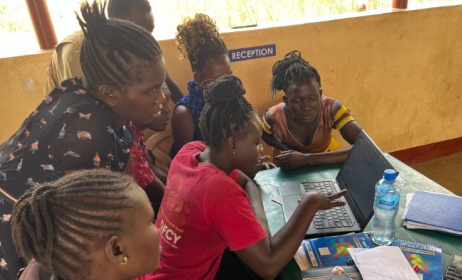South Sudanese musicians sing for peace
Musicians from South Sudan called out for peace, empathy and reconciliation during the recently concluded Jere Jere peace concert.
 US-based South Sudanese musician Dynamq (middle) posses with fans at the Jere Jere concert.
US-based South Sudanese musician Dynamq (middle) posses with fans at the Jere Jere concert.
The concert, which attracted thousands to the country’s capital Juba, took place on 30 September at the Basketball Stadium. South Sudanese musicians from the diaspora and those from the region each took turns to spread messages of peace.
The world’s youngest nation has been devastated by political and tribal violence with more than 1 million people fleeing their homes since fighting broke out in December 2013 between government and rebel forces.
“I love my country and it was for that reason that I organised the peace concert and I am proud that we made history by holding the biggest concert in South Sudan,” music promoter Sam Bosco told Music In Africa.
“The aim of the concert was to unite people. I am glad that I was able to be part of the national healing process through music, which is a universal language.”
Bosco said he was happy with line-up at the event, which was headlined by US-based South Sudanese reggae-dancehall artist Dynamq, and that the crowd response had been overwhelming.
Dancehall musician Kawaja Revolution told Music in Africa that he had never experienced such a big turnout since the beginning of the South Sudanese Civil War.
“As a young musician I lost a lot of audience because many people left the country during the war, and I couldn’t make new music, tour or hold regular shows,” he said. “Performing at the peace concert reminded me why I wanted to be a musician; seeing people happy gave me a reason to start recording new music.”
Apart from being given a platform to showcase their music, the Juba-based musicians got the opportunity to interact with their colleagues who live and work outside the war-torn country. They then joined hands to record a song that will be released later this year.
“Meeting with friends and colleagues from the same field was an honour for me because it is through learning from those who are experienced that we become better musicians,” gospel artist and member of the Star Eagles Dennis Denaya said.
“I met Dynamq who is one of the pioneers of South Sudanese music. Listening to him speak about his journey in music gave me the confidence to keep singing, since the gospel industry is still developing”.
Denaya said his entire village was displaced when the war broke out, forcing him to flee as a refugee to Uganda to complete his studies. He then returned to South Sudan and began working with an NGO, which has helped him develop his career as a musician. Like many South Sudanese living in Juba, Denaya is in possession of a Ugandan refugee card.
The music industry in South Sudan is yet to be given full attention by the government. Bosco said this could only happen once there was peace in the country.
“Once we are politically stable we can now begin to push for musicians’ rights and an association for musicians,” he said. “But until then, I will continue to create platforms for our musicians to showcase their talent and I ask the international media to give our artists support because we have great music and culture to show to the world.”
Denaya said: “The war in South Sudan has crippled the music industry but we do hope that things will change for the better.”
Other artists who performed at the Jere Jere peace concert included Silver X, WJ The King, DJ Cent, Nesty Beibi, Tutu Beibi and MClomex.




























Comments
Log in or register to post comments